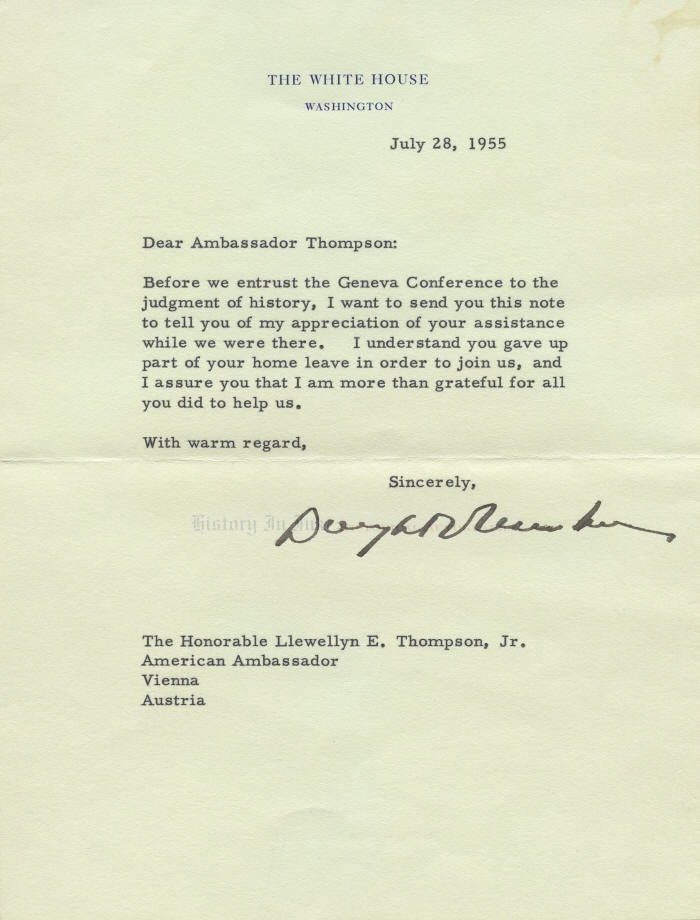

1403304
Dwight D. eisenhower
From the Estate of Llewellyn E. Thompson,
United States Ambassador to the Soviet Union
Eisenhower thanks Thompson for his help during the
1955 Geneva “Big Four" Summit to ease Cold War tensions
Dwight David Eisenhower, 1890-1969. General of the Army; Supreme Commander, Allied Expeditionary Force, World War II; 34th President of the United States, 1953-1961. Typed Letter Signed, Dwight D. Eisenhower, one page, 6¾" x 8⅞", on stationery of The White House, Washington, [D.C.], July 28, 1955. With original envelope.
The end of World War II ushered in a deterioration in the relationship between the United States and the Soviet Union and the emergence of the Cold War. Allied against Nazi Germany, the two countries became political and military rivals as the United States, assisting Western European democracies, pushed back against Soviet domination of Eastern Europe. In 1946, in an address entitled “The Sinews of Peace" that he delivered at Westminster College in Fulton, Missouri, former British Prime Minister Winston S. Churchill warned: "Nobody knows what Soviet Russia and its Communist international organisation intends to do in the immediate future, or what are the limits, if any, to their expansive and proselytising tendencies. . . . From Stettin in the Baltic to Trieste in the Adriatic, an iron curtain has descended across the Continent." The Soviet Unionʼs detonation of its own atomic bomb in 1949 erased American nuclear superiority. Relations between the two countries were strained not only by what the United States viewed as the Soviet Unionʼs failure to keep the agreements that it made at Yalta, but also by the Korean War, which broke out in 1950, and Soviet support for the Communist government in North Korea. When the United States intensified its nuclear research and produced the hydrogen bomb in 1952, the Soviets followed suit in 1953.
The death of Josef Stalin in March 1953, however, and the Korean armistice of July 1953 cooled tensions somewhat as a new regime took control in the Soviet Union. By 1955, the time was ripe for discussions about increasing global security.
On July 18, 1955, the “Big Four,” led by the United States and the Soviet Union, assembled in Geneva, Switzerland. President Eisenhower met with Soviet Premier Nikolai A. Bulganin, British Prime Minister Anthony Eden, and French Prime Minister Edgar Faure. Their foreign ministers, including U.S. Secretary of State John Foster Dulles and Soviet Foreign Minister Vyacheslav Molotov, also attended. Present, too, was Nikita S. Khrushchev, the First Secretary of the Soviet Communist Party—the de facto leader, who held virtually unlimited power inside the Soviet Union.
The purpose of the summit was to reduce international tension, and the relationships that the Big Four made at the meeting gave reason for optimism that the Cold War would thaw with cooperation between the Western democracies and the Eastern Communist block. The Big Four discussed a number of topics, including the unification of Germany, which had been divided into four zones controlled by the United States, Britain, France, and the Soviet Union after World War II; global free trade; tariffs; the arms race and disarmament; and international security. Eisenhower proposed an “Open Skies" plan, an international monitoring system aimed at preventing countries from stockpiling weapons, particularly nuclear devices. Ultimately the countries reached no agreements, but the summit nevertheless helped to ease world tension.
In this letter, Eisenhower thanks Ambassador Llewellyn E. “Tommy" Thompson, then the United States ambassador to Austria, for his assistance during the summit . He writes, in full: "Before we entrust the Geneva Conference to the judgment of history, I want to send you this note to tell you of my appreciation of your assistance while we were there. I understand you gave up part of your home leave in order to join us, and I assure you that I am more than grateful for all you did to help us. / With warm regard . . . ."
Thompson (1904-1972) was a career American diplomat who served at a critical time in history as the United States Ambassador to the Soviet Union under Presidents Eisenhower, John F. Kennedy, and Lyndon B. Johnson. Thompson joined the Foreign Service in 1928, and during his long and distinguished career he served as the United States Ambassador to Austria from 1955 to 1957. It was during that service that the Geneva Summit occurred. Eisenhower appointed Thompson Ambassador to the Soviet Union in 1957, and Kennedy reappointed him in 1961. He resigned in 1962, but Johnson reappointed him in 1967, and he served until 1969. He also held the posts of Career Ambassador and Ambassador At Large. He was part of the Executive Committee of the National Security Council, or ExComm, which advised Kennedy during the Cuban Missile Crisis in 1962, and he was present at Johnson's summit with Soviet Premier Alexei Kosygin at Glassboro, New Jersey, in 1967. He came out of retirement to advise President Richard Nixon on the Strategic Arms Limitation Treaty (SALT) negotiations with the Soviet Union and represented the United States in the SALT talks from 1969 until he died in 1972.
This letter is in fine to very fine condition. It has one horizontal mailing fold, which does not affect Eisenhowerʼs large 3⅞" black fountain pen signature, and a small stain at the upper right, affecting nothing. The original envelope was sent via diplomatic pouch and therefore has no postal markings. It was opened without tearing the flap. There is glue residue from the flap on the back of the envelope and slight edge toning, which is more pronounced on back. The envelope is in fine condition.
Provenance: This letter comes directly from Ambassador Thompson's estate. We are pleased to be able to offer it for the first time on the autograph market.
Unframed.
_____________
This item has been sold, but
click here to see other
Presidents and First Ladies items
that we are offering.



